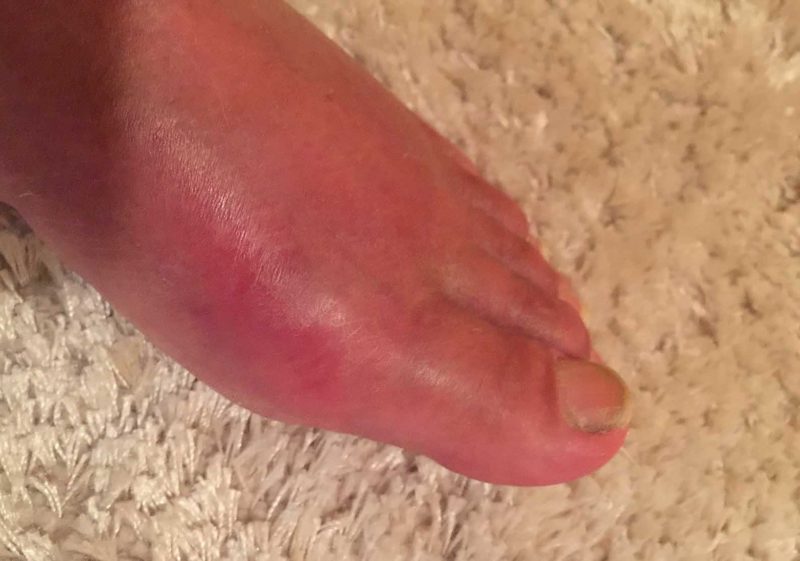When people think of swollen feet, most consider the most common causes for the symptom: pregnancy, injury, or a job that requires a lot of walking. But many get swollen feet when these things aren’t the case. In those situations, what’s the cause?
YOU MAY ALSO LIKE: 8 Reasons Sleeping Solo is Good for Your Health
Some will just prop their feet up for a few minutes, ice them, or give them some time to rest. Normally, this will work, but there are some cases when swollen feet are a symptom of something more serious. If you’ve rested and elevated your feet and there’s no obvious cause to the issue, it could be a sign of an underlying medical condition.
Read on to learn about some of the more serious causes of swollen feet.
LYMPHEDEMA
“Lymphedema refers to swelling that generally occurs in one of your arms or legs,” notes the Mayo Clinic. Lymphedema in one’s leg may cause severe and painful swelling in the ankle, foot, and toes. Symptoms of lymphedema include aches, discomfort, recurring infections, tightness or heaviness, and swelling in part or all of a limb.
DEEP VEIN THROMBOSIS (DVT)
The Mayo Clinic also mentions another reason for swollen feet: Deep Vein Thrombosis. “Deep vein thrombosis (DVT) occurs when a blood clot (thrombus) forms in one or more of the deep veins in your body, usually in your legs.”
DVT may create pain and swelling in legs and feet, and it can be serious because of blood clotting. If a blood clot breaks loose and travels through your veins it may blocks blood flow. For example, if the clot travelled to your lungs it could cause a pulmonary embolism. DVT is serious and you should seek immediate medical care if you’re concerned you may have it.
EDEMA
A condition called Edema is a buildup of fluid in legs, feet, and ankles causing swelling due to this fluid retention. The American Heart Association notes one of the symptoms of heart failure is edema — a buildup of fluid.
OSTEOARTHRITIS
WebMD. cites Osteoarthritis, as another potential cause of foot swelling. This is the most common form of arthritis and is sometimes called “wear-and-tear” arthritis, because cartilage breaks down as we age.
Osteoarthritis in the feet and ankles can cause pain, tenderness, stiffness, and swelling. People suffering with osteoarthritis may also find it difficult to walk or bear weight on those joints.
BURSITIS
Bursitis impact fluid sacs that cushion bones, tendons, and muscles. Those with bursitis often have joints that feel stiff and achy, and appear red and swollen. The joint will hurt more when you try to move it or when you press on it. Bursitis usually affects shoulders, hips, and elbows, but it can also affect knees, heels, and big toes.
GOUT
Gout, another form of arthritis, is one of the most painful. The National Institute of Arthritis and Musculoskeletal and Skin Diseases explains, gout results when uric acid builds up in the body. Common gout symptoms include pain, redness, stiffness, heat, and swelling
Many first feel the pain of gout in the big toe, but it can also affect the joints of the ankles, heels, insteps, knees, wrists, fingers, and elbows.
CELLULITIS
As the US National Library of Medicine notes, “Cellulitis is an infection of the skin and deep underlying tissues.” This serious skin infection can cause the skin to become swollen, red, and tender. The area may also feel hot when you touch it. Although cellulitis can occur anywhere on the body, it usually affects the lower legs.
ACHILLES TENDENITIS
As the American Academy of Orthopaedic Surgeons explains, Achilles tendinitis is a common condition, causing pain in the heel and back of the leg. There can also be swelling around the heel and ankle, which may worsen after physical exercise. Just ask any major athlete who has suffered Achilles issues.
If you believe your swollen feet are a symptom of a medical conditions, we advise seeking advice from a Doctor.
